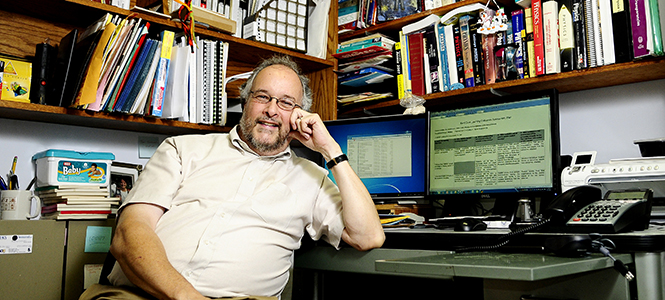Online courses continue to grow
Physics professor Jon Secaur teaches 7 Ideas That Shook The Universe and Physics In Entertainment And The Arts online. “I try to respect my students’ intelligence and time by only asking them to do projects that are worthwhile,” said Secaur. Photo by Hannah Potes.
September 21, 2012
In the fall of 2010, instructor Michael Mahan was teaching his class, Visual Design Literacy, for the first time. He was asked by the School of Visual Communication Design to develop an online version of the class during winter break of that school year, which was first taught in the Spring 2011.
As several classes shift to an online format, developing and teaching these classes can pose several challenges to instructors.
“It’s an exercise in information architecture,” Mahan said.
Deborah Huntsman, the executive director of continuing and distance education, said the number of online courses has been growing steadily for the past 4 years. This summer, for the first time ever, there were more Kent State students enrolled in online courses than face-to-face courses.
Huntsman said the growth is continuing with plans for 10 to 12 new fully online graduate courses in the next few years and 50 to 75 undergraduate transfer-module courses.
Mahan said professors must design a class that would “teach itself” online.
“With an online class, you sort of have to predict,” Mahan said. “Is this really clear? What problems could come up?”
While designing the class, Mahan said he had to stop and think of who his audience was and make sure he created a message that would reach everyone in the class.
“If people don’t understand something, you have to go back to tweak and change the material,” Mahan said.
After changing an aspect of the course, Mahan said the following semester he pays close attention to the parts of the class he adjusted to see if the changes helped students.
“Not only does the material have to be labeled clearly, but the interface has to be organized extraordinarily well,” Mahan said.
This means making sure the course interface has no extra information and everything is labeled concisely and clearly, Mahan said, so students are not intimidated.
Mahan said he has gotten feedback from students that his online class material is clearer than other classes.
“I think I’ve had success because it wasn’t too long ago that I was a student,” Mahan said.
Jon Secaur, an assistant professor in the physics department, developed the online version of Seven Ideas that Shook the Universe. He said the biggest challenge of designing an online course is adjusting the way of thinking.
“What you don’t want to do is simply convert things over,” Secaur said. “We don’t want to digitize the experience in the classroom.”
Secaur said the class structure is made up of 11 modules each with a “map” suggesting how to proceed, but the course is ultimately student-guided. He said this gives students the ability to adjust the class to fit their particular learning styles.
The class content includes slideshow presentations with narration, videos and viewing guides.
Secaur said most of this content can be paused, fast-forwarded and rewound, which gives students the ability to skip content they already know and revisit material they need to review.
Students complete four major projects throughout the semester, Secaur said, and each project allows students to choose what they will do, within guidelines.
“Online learning really does put students in command of the class and in command of their learning,” Secaur said.
Both Secaur and Mahan said online classes have advantages and disadvantages for students.
Secaur said students think online classes will be easy, but they are not always a walk in the park.
“Conscientious people can do really, really, well,” Secaur said.
The trouble with online classes, Secaur said, is students do not always know how to take an online class.
It requires responsibility, commitment and discipline, Secaur said.
“It seems to me that I get more extremes in performance in the online classes,” Secaur said.
Kristina Beck, senior business management major, said she likes online classes because they allow her to plan studying around her job. However, Beck said online classes also have their drawbacks.
“It’s hard because if you do have a question, you have to wait around,” Beck said.
Justin Jordan, sophomore business management major, said he is a nontraditional student who works, so the online classes are convenient for him. However, he said the classes should be made more similar to regular classes.
“With my schedule, I like the online classes, but I think they need a lot of work,” Jordan said.
Jordan said this includes making the classes more structured and organized.
Mahan said if the interface of an online class is well organized, the lecture is engaging, the checkpoints actually gauge knowledge and the students give the class a chance, he thinks online classes are great.
“If any of it doesn’t happen, the class can fall flat,” Mahan said.
Secaur also said online classes are positive because of their flexibility and the opportunities they present. This includes opportunities for post-secondary students, Secaur said.
However, Mahan and Secaur said they prefer teaching face-to-face.
Mahan said in a classroom, he is able to watch students’ expressions and adjust how he presents material in order to meet their needs. This is something he cannot do while teaching an online class.
Mahan also said when speaking to a live class, he can control which points are stressed and can answer questions on the spot.
Secaur also said he prefers teaching his students face-to-face and getting to know them.
“What I like about [teaching] is seeing people light up when they get it,” Secaur said.
Mahan also said he dislikes not being able to meet his students in person.
“I prefer a live version because it is just talking to people,” Mahan said. “That is 100 percent what teaching should be about.”
Contact Audrey Fletcher at [email protected].

























